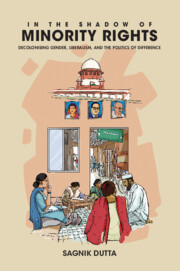1 - Right to be righteous: Constituting rights, travelling constitutions
Published online by Cambridge University Press: 15 March 2025
Summary
Say if you go to the police chowki and speak to them and it appears that our rights are of no consequence. This attitude will not do. They [the police] must register a complaint. You must confront them and tell them that these are our rights (humara huq) and you [the police] must take action.
—Mumtaz Shaikh, BMMA activistMumtaz Shaikh, an activist of the BMMA, conducted a range of workshops and training sessions with other working-class Muslim women in her neighbourhood. In these sessions, she spoke about the difficulties that Muslim women faced when they approached the police for redressal of grievances such as domestic violence. In her discussion of these difficulties, she invoked the rights (huq) of Muslim women in terms of the rights of a collective, communal entity. For Shaikh, rights became meaningful in these moments of collective communal mobilisation for rights.
In a similar training session, Noorjehan Safia Niaz, a founder member of the BMMA, spoke of the right to religious freedom for Muslim women. She construed the right as the freedom that allowed women to carry out the duty towards individual and collective self-improvement. The right to religious freedom was exercised through political action. Activists understood the right as the right to collectively challenge and reconstitute religious authority in spaces of adjudication of Muslim law on marriage, divorce and maintenance. This was not merely a form of individual freedom that enabled women's autonomy. Collective organising to challenge religious authority in communities was considered a pious obligation and a duty for women who wanted to construct a more just world in accordance with the principles of the Quran. In the activism of the BMMA, an ethic of duty reconstituted liberal freedoms such as the right to religious freedoms in moments of negotiation with Muslim family law and minority rights.
This chapter builds on participant observation in the workshops on the Quran and the Constitution conducted by members of the BMMA. It traces how discourses on marriage and divorce rights within the framework of Muslim Personal Law interact with the fundamental rights guaranteed by the Indian Constitution, especially the right to religious freedom and how transnational ideas of Islamic feminist ethics shape these interactions.
- Type
- Chapter
- Information
- In the Shadow of Minority RightsDecolonising Gender, Liberalism and the Politics of Difference, pp. 49 - 66Publisher: Cambridge University PressPrint publication year: 2025

